2024 has arrived. As we all shift back into work mode, the digital landscape – particularly on LinkedIn – is overflown with an endless stream of tech retrospectives and predictions.
Looking back at 2023, however, the summary from a technology standpoint is straightforward. The past year marked a significant milestone: the mainstream emergence of Generative AI, with ChatGPT leading the way.
This wasn’t just a technological breakthrough; it turned into a cultural phenomenon.
However, alongside the excitement, a cautious narrative emerged.
Public discourse has leaned heavily towards AI’s risks, overshadowing its potential benefits.
This trend is evident in Google search trends, where concerns about AI’s risks are more than double those of its benefits.
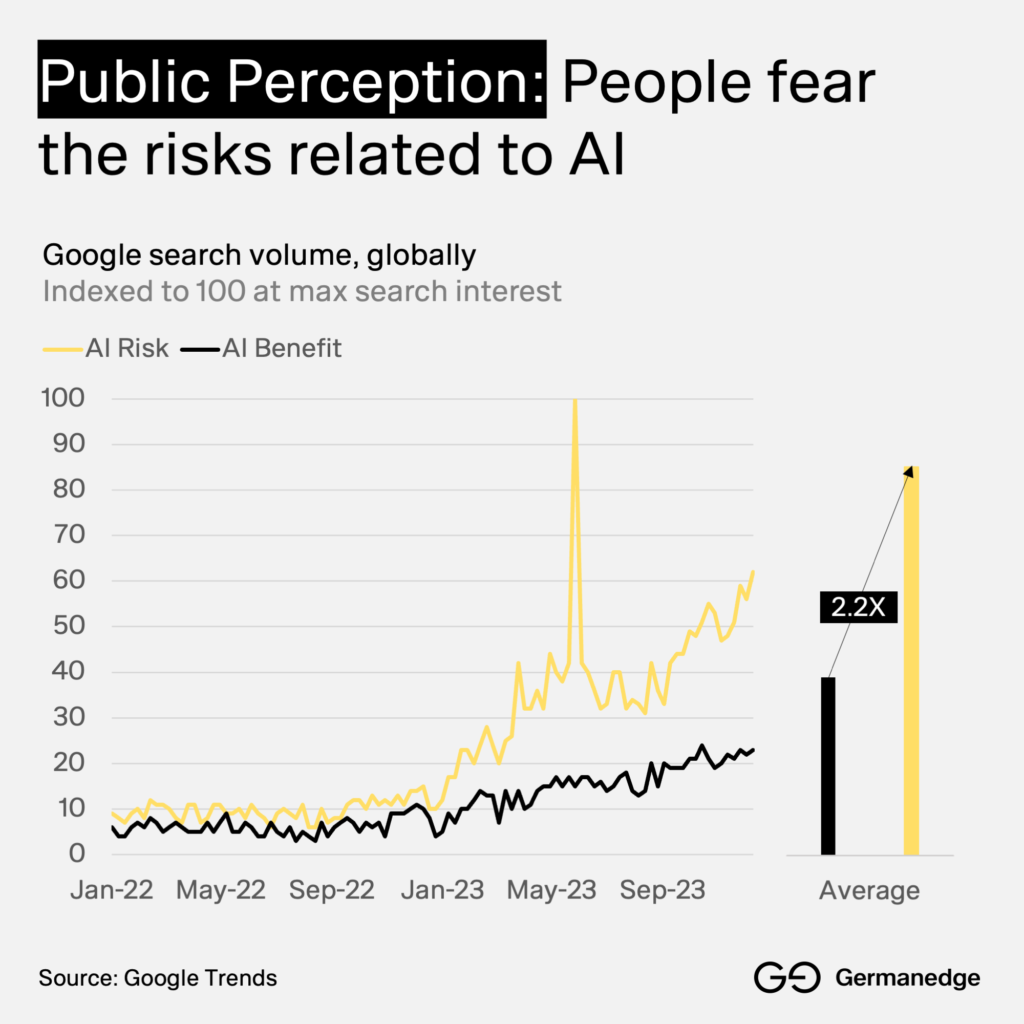
As the chart reveals, searches concerning AI’s risks notably outnumber those exploring its benefits – by more than double.
In this 2024 opening post, I want to shift this perspective.
As the CEO of Germanedge, my hope – or rather my resolution – for 2024 is to see us embrace AI, particularly in the German manufacturing and industrial sectors.
It’s high time we start nurturing an AI innovation mindset!
What does it take for us to embrace this technological leap, especially on a company level?
That’s the question I aim to start exploring in today’s discussion.
The Perception Gap: Public Fear vs. CEO Optimism
In Germany, a country known for its precision and cautiousness, the public sentiment towards AI is marked by even more deep-seated concern. A recent survey by Civey highlights this:
42% of German respondents – so almost half – view the long-term impact of AI more negatively than positively.
This statistic reflects a society wrestling with „German Angst,“ especially in the context of AI and innovation.
However, there’s an intriguing contrast when we shift our focus from the general public to those at the helm of our companies. In a compelling keynote, Mark Raskino, VP Analyst at Gartner, sheds light on a different perspective. Data from Gartner’s annual executive survey reveals that among the world’s CEOs, a substantial majority – nearly 80% – view AI as a beneficial force, believing its advantages far outweigh any potential risks.
In other words, while the (German) public is mostly critical of our AI future, the world’s economic leaders welcome the impact of AI and have already committed to it.
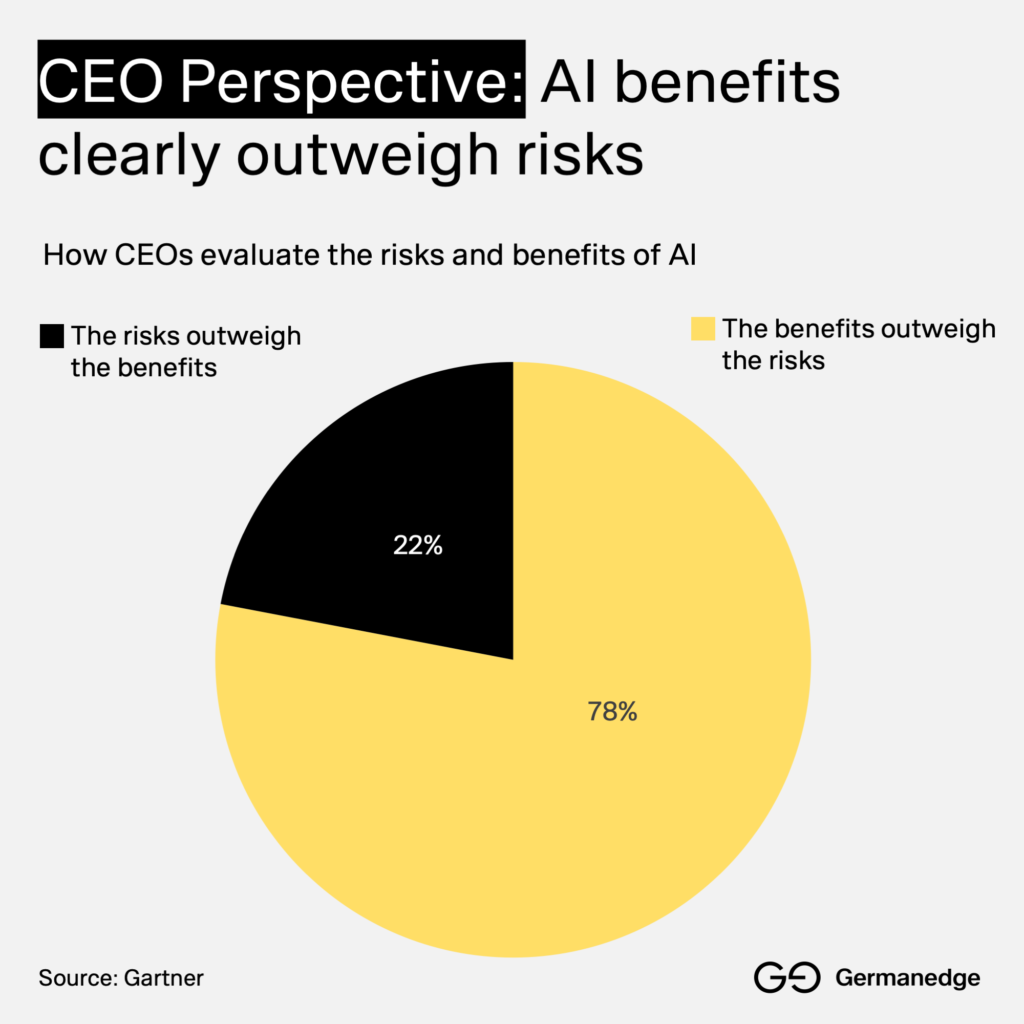
More than that, the world’s economic leaders are not only embracing AI but are actively developing strategies for its implementation. Additional Gartner survey results reinforce this point.
More than half of global CEOs today view AI as the most transformative force for the next three years, a significant increase from just 21% last year.
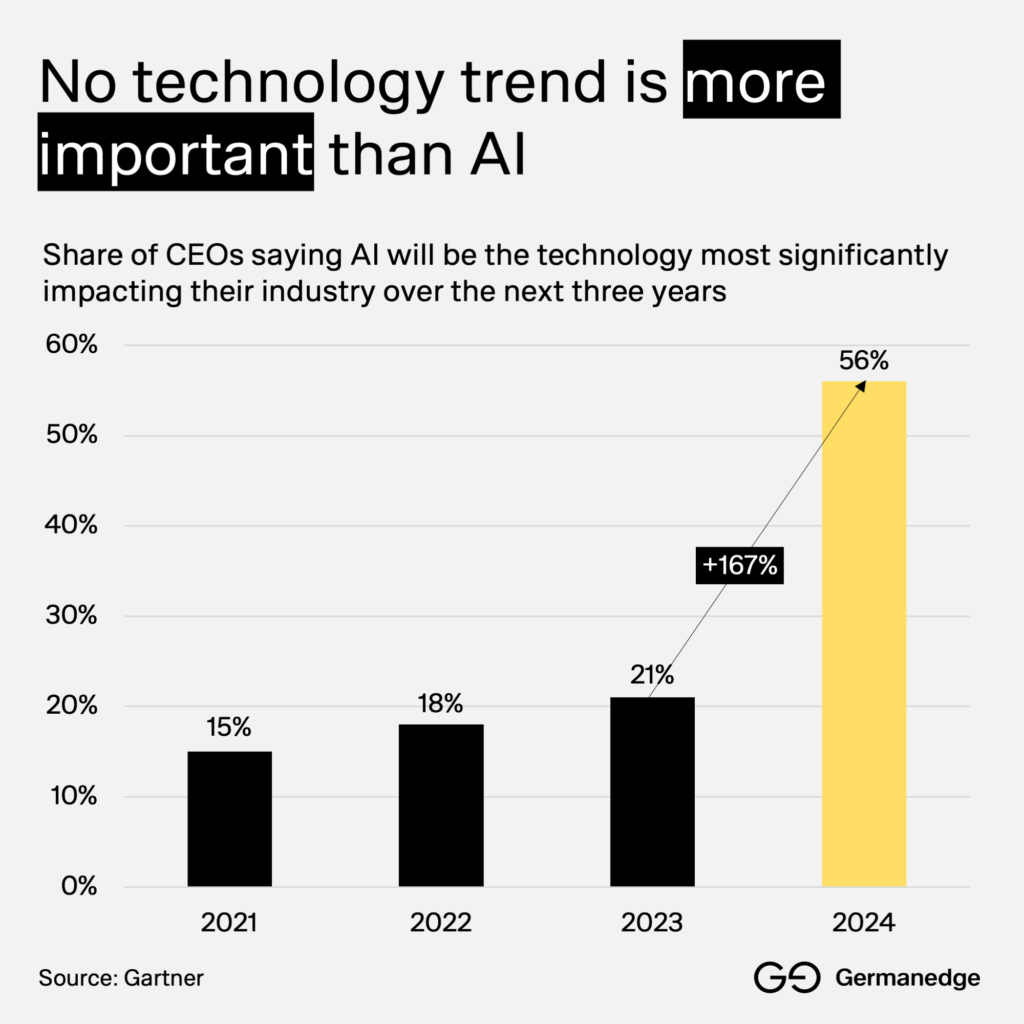
Even more telling is the fact that the AI optimism shared by executives is not limited to interviews to please the public; they are actively taking place among CEOs and their executive peers at the highest levels of corporate governance.
About two-thirds of CEOs have addressed Generative AI in a supervisory board meeting in 2023.
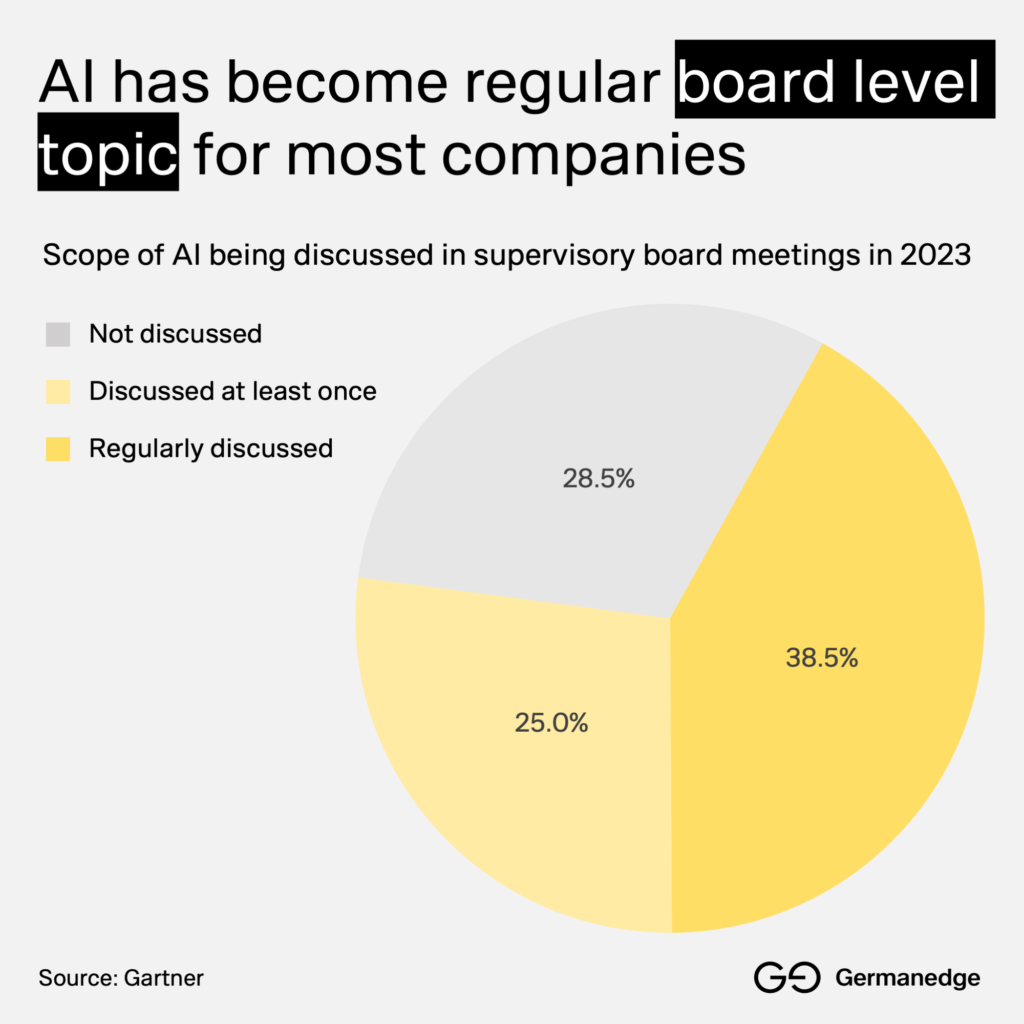
And if that wasn’t compelling enough, instead of viewing AI merely as a means to replace human workers (a common critique), 74% of these board-level discussions focus on leveraging Generative AI to drive future growth.
In simple terms, most CEOs don’t see AI as a cost-cutting tool; rather, they view it as a catalyst for expanding their companies’ top-line growth!
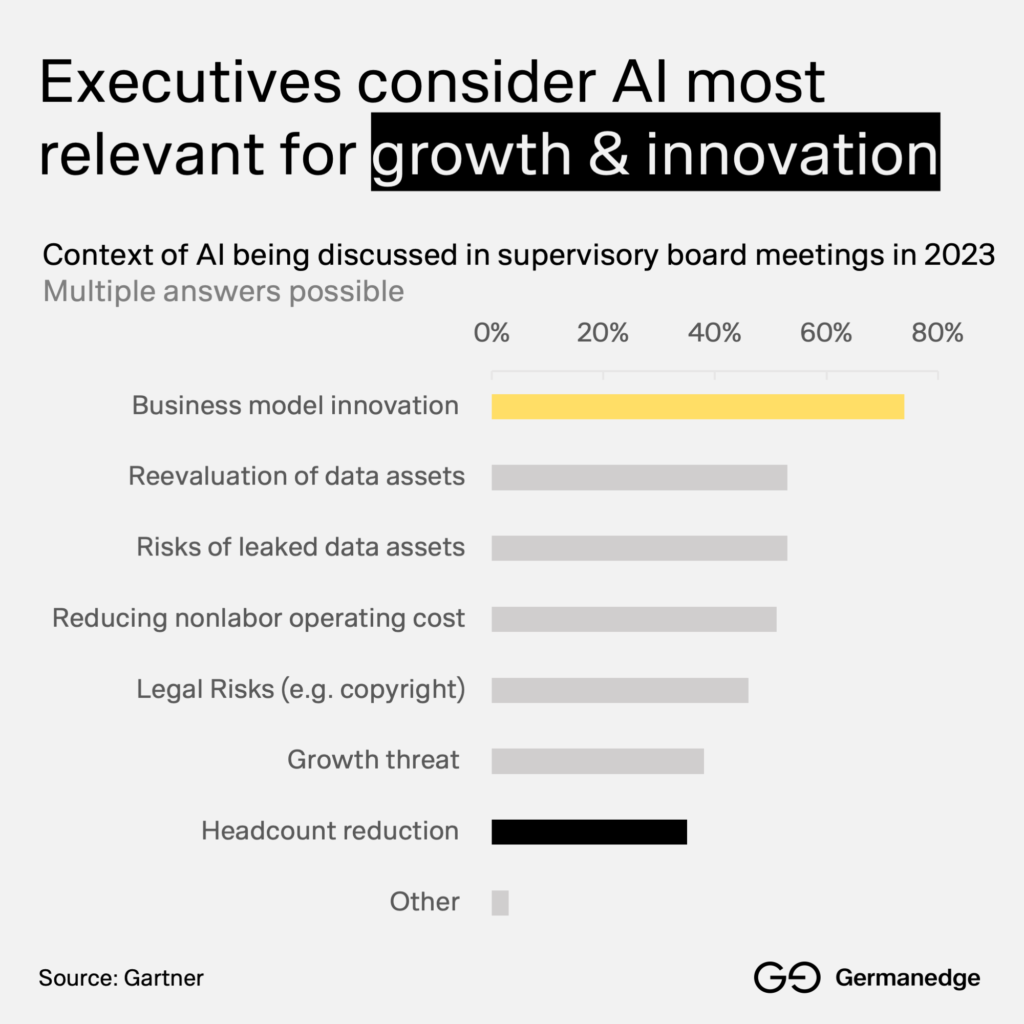
More Than Optimism: CEOs Embrace AI
My key conclusion from all these data points: There is a rare consensus among CEOs worldwide regarding the positive impact AI will have on their businesses.
This consensus among CEOs marks a pivotal moment. The pronounced gap between public perception and the views of corporate leaders, calls for a realignment with the global CEOs‘ vision.
Their optimism and recognition of AI’s benefits are founded on a profound understanding of technology’s role in enhancing innovation, efficiency, and competitiveness. This understanding is not theoretical but born from firsthand experience. An interesting side fact: nearly half of all CEOs used ChatGPT in the first half of 2023 themselves to support them in their jobs.
This leads us to an important question: how can companies harness the power of AI effectively going forward?
The answer lies in structural preparation, which brings me to my key point for today.
The Pivotal Role of CIOs
In the wake of a rapidly evolving technological landscape, it’s become increasingly clear that Germany, along with its economy, cannot afford to lag behind in the AI revolution. As I’ve previously emphasized, our economy has been slow to embrace digitalization, a trend we must urgently reverse when it comes to AI.
In this context, the role of dedicated technology leaders, usually in the form of Chief Information Officers (CIOs) or Chief Technology Officers (CTOs) in large organizations becomes paramount.
Gartner’s survey results underscore the criticality of CIOs in AI adoption and acceleration.
Nearly one-third of global CEOs agree that the CIO is the corporate leader best positioned to spearhead and unlock the value of Generative AI.
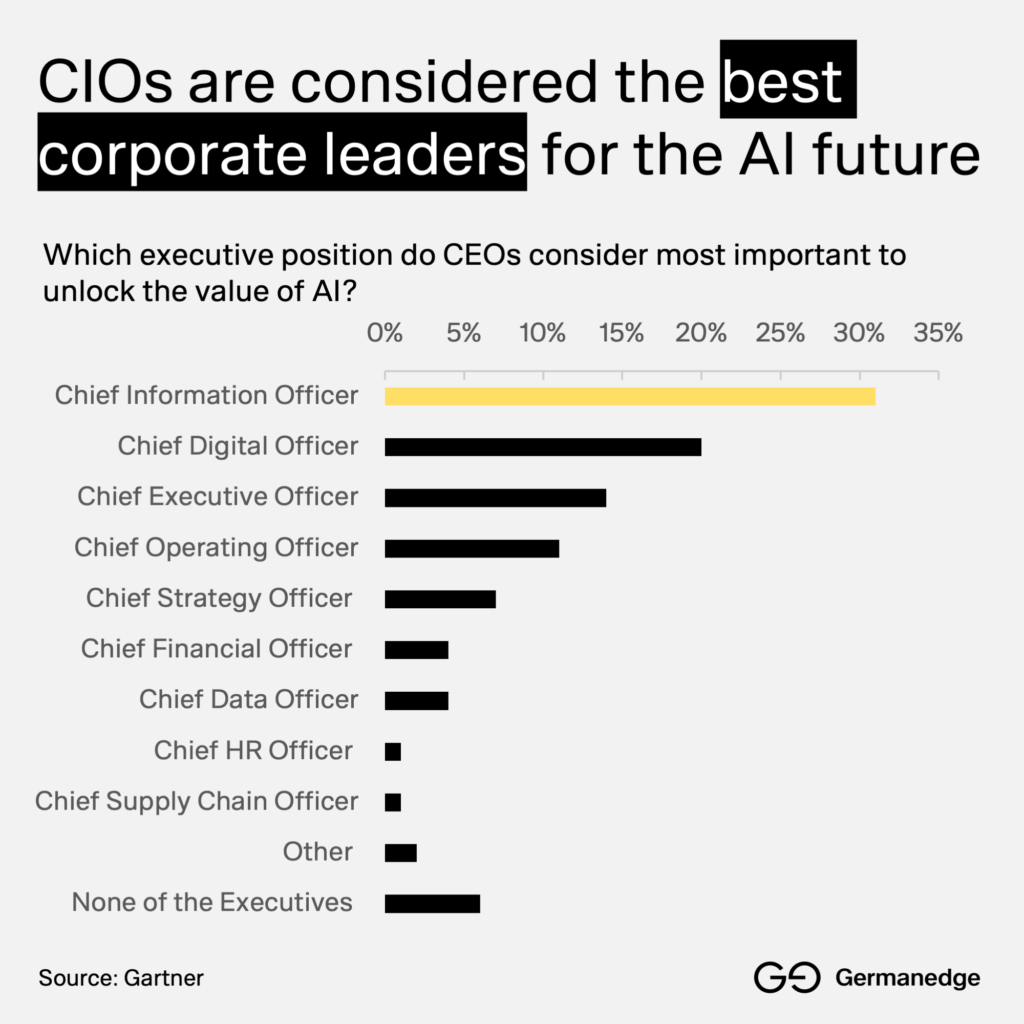
This perspective is further supported by IBM research, which showcases that CEOs consider their tech chiefs (CIOs and CTOs) as the most critical members of the C-suite in the coming years, ranking them significantly higher than CMOs or other roles.
What these facts prove is that it’s evident that driving AI priorities requires more than just the CEO’s vision; it necessitates representation at the board level by a dedicated executive. The CIO, as the principal data and technology strategist, is ideally suited for this role.
As the CEO of Germanedge, I clearly understand the dual role a CEO plays. On one hand, there’s the crucial task of managing the company’s present-day operations. On the other hand, there’s the equally important role of shaping the future. Juggling these responsibilities can be challenging, and, in many cases, it’s not the most effective approach.
In my experience, delegating the responsibility of future-thinking and innovation – particularly in areas like AI – is not just beneficial; it’s necessary. This is where the role of a CIO or CTO becomes invaluable. They bring specialized expertise and a focused approach to technological advancements, making them ideal for steering the company’s journey into the future of AI.
So, given the undeniable AI transformation, the CIO’s role will drastically evolve.
- Beyond managing the existing IT infrastructure, CIOs are now pivotal in driving innovation and business growth.
- They are increasingly seen as connectors across various business functions, adept at reallocating technology resources to enhance agility and efficiency.
This dual mandate of streamlining operations while creating new digital revenue streams requires an expanded skill set.
How does this look like?
Successful CIOs must excel in essentially three areas, as PWC nicely describes in their CIO manifesto:
- Understanding technology (including AI)
- Applying technology to further business objectives
- Recognizing technology’s strategic role in the industry.
With this “triple threat,” CIOs are becoming indispensable members of the C-suite in successful organizations.
This trend is also something I regularly encounter in my interactions with our Germanedge clients.
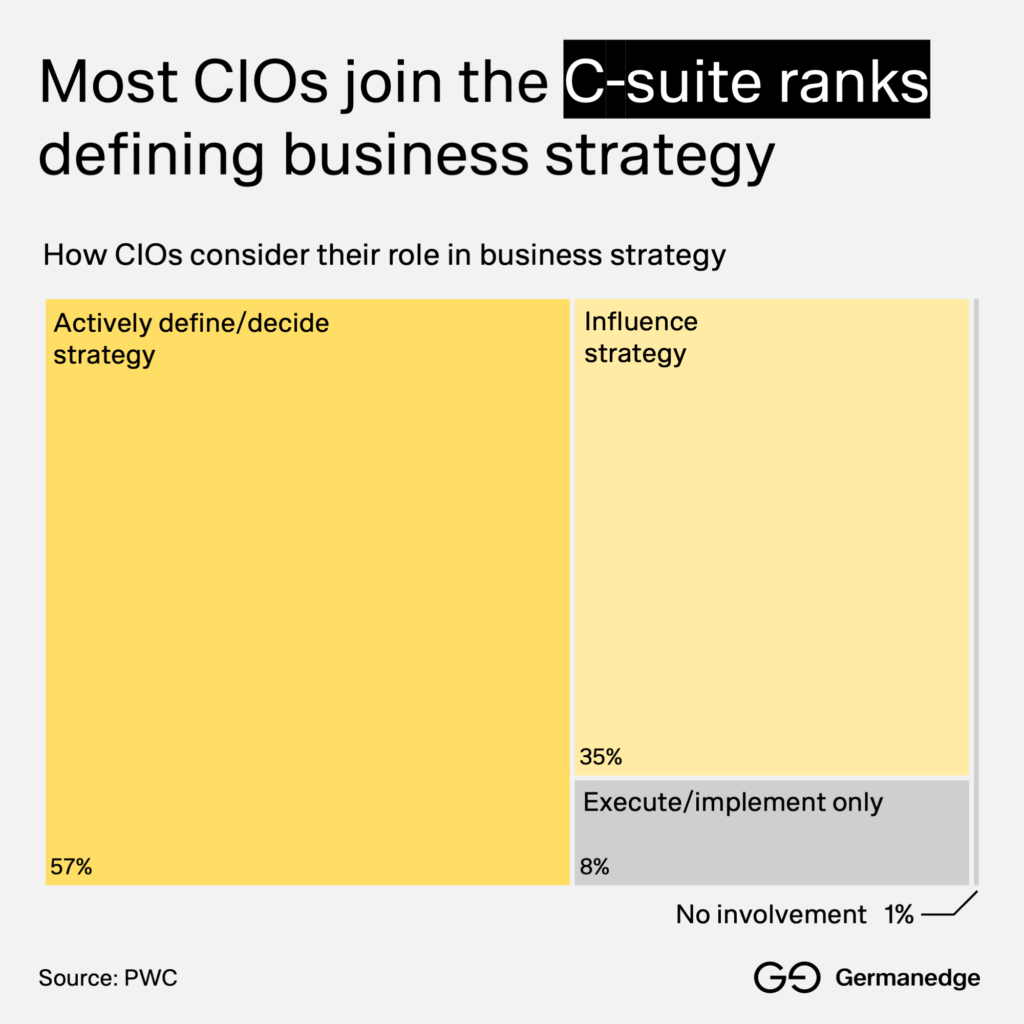
With all that in mind, my hope for the new year is to see more companies, particularly German SMEs, listen to their CEOs, prioritize their AI initiatives, and empower their CIOs to spearhead this crucial transformation.
Leading the AI Transformation with Germanedge
Entering 2024, my personal resolution is to support this movement and support our clients in mastering this change. We’re not just observers in this journey; we’re active drivers, partnering with CEOs, CIOs, and CTOs to bring AI’s full potential to the forefront of the German industry.
At Germanedge, we’re geared up to turn AI reservations into tangible success stories. Our mission is personal and straightforward – to empower businesses, especially in the German manufacturing sector, to not only navigate but excel in the AI era.